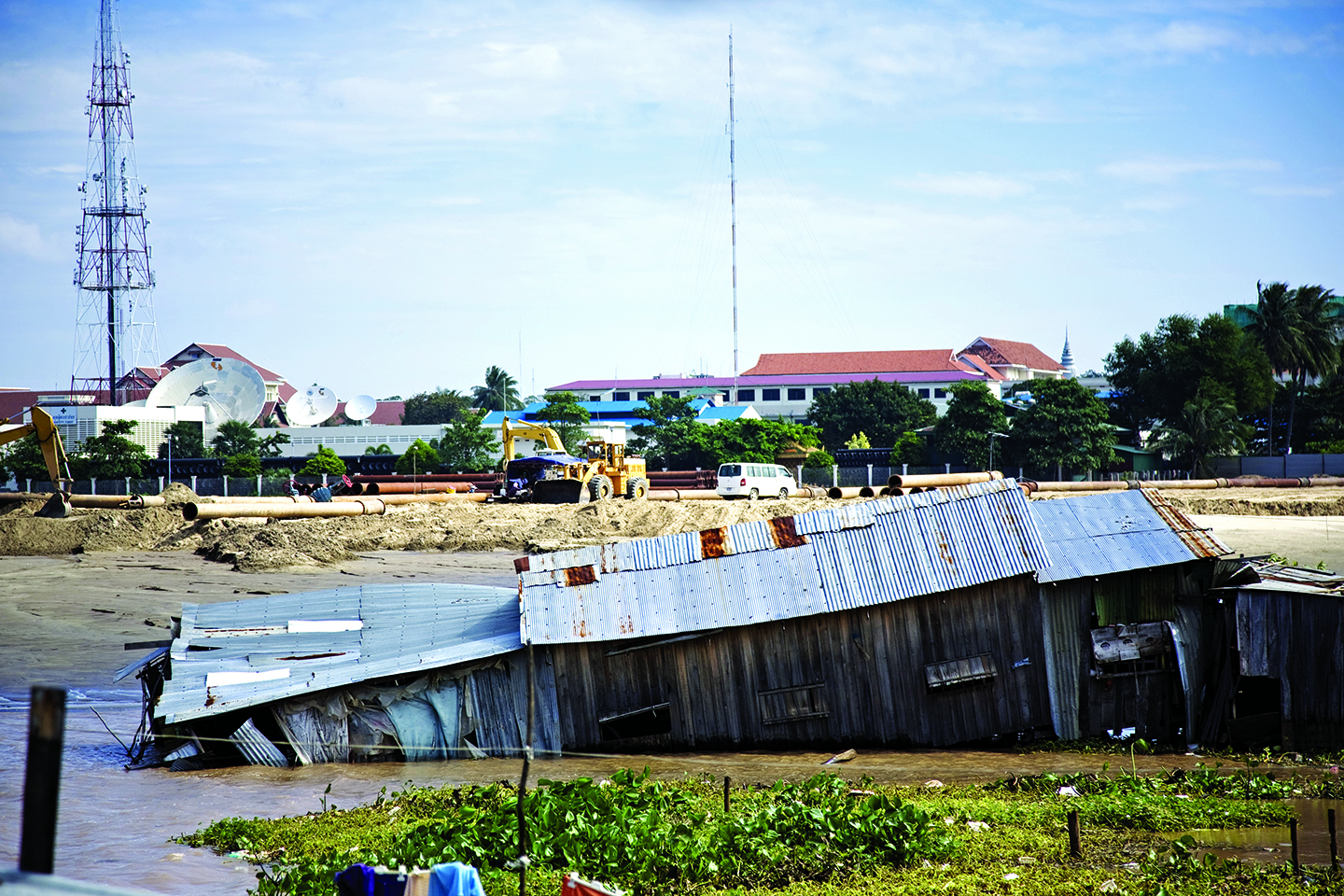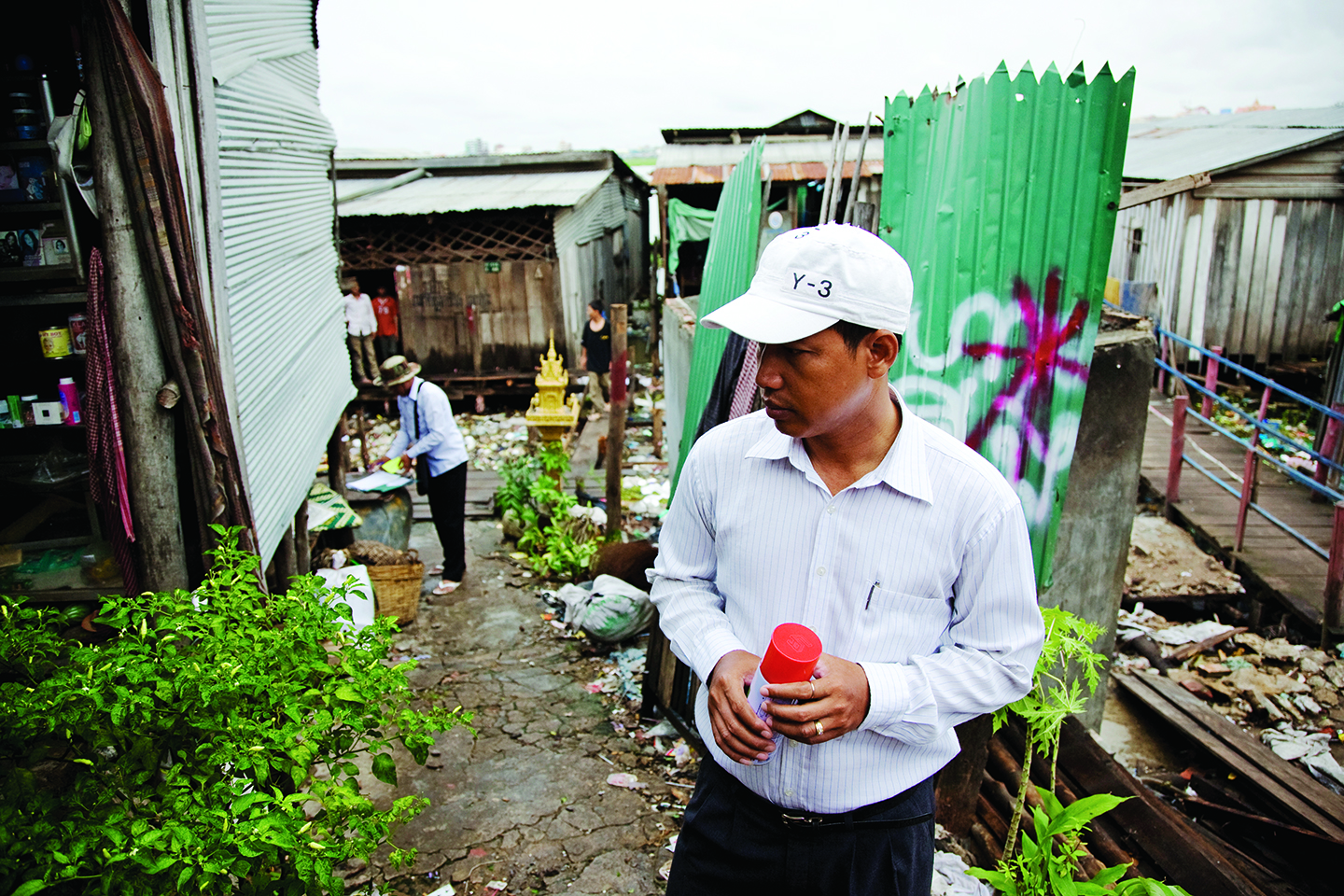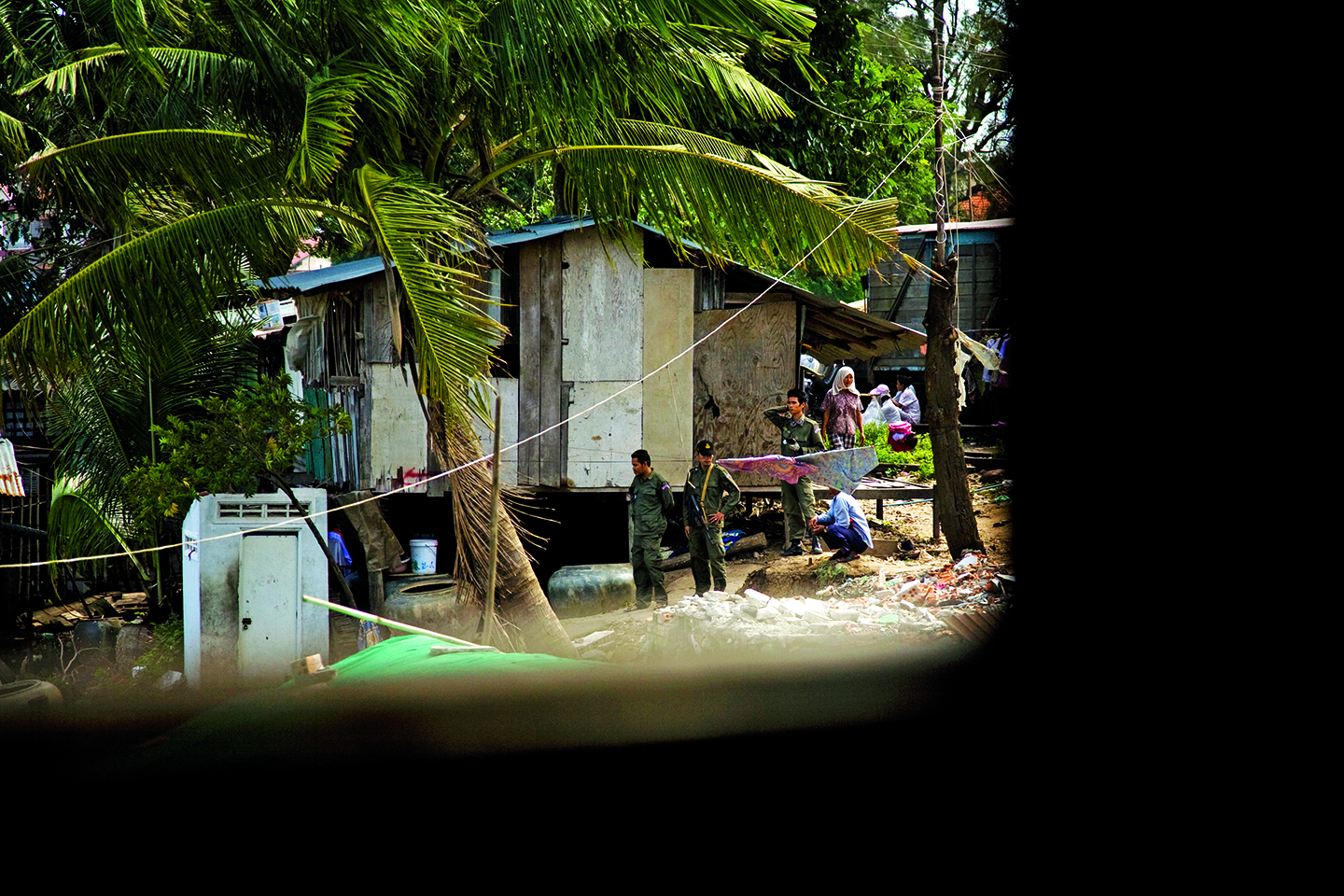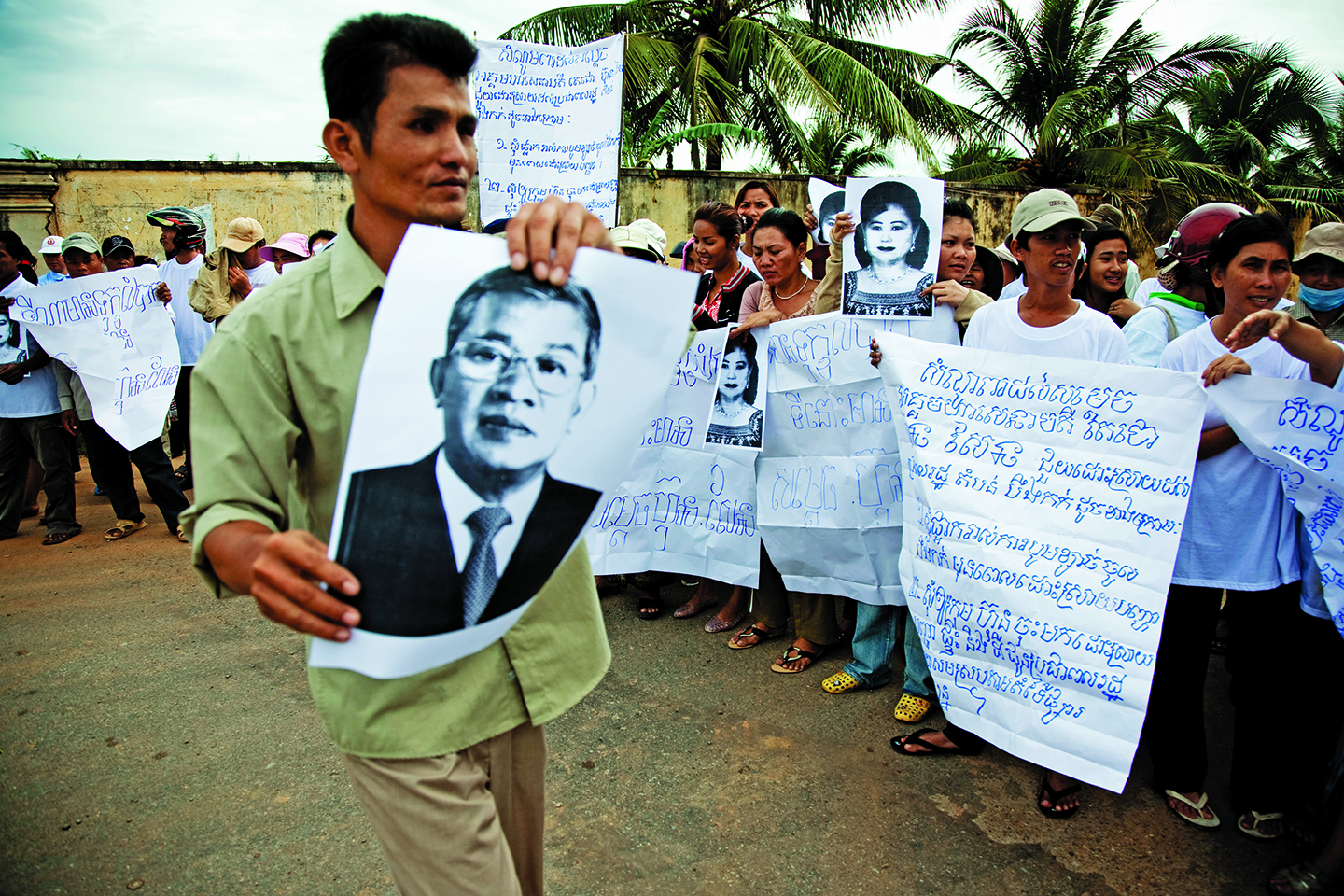Editor’s note: Few land rights cases have been more infamous in Cambodia than the long-running struggle of the Boeung Kak Lake residents. Where once the lake provided life and livelihoods to the community that grew around it, the dry sands of Boeung Kak now sag beneath seemingly never-ending construction. And with nowhere else to drain, the water left rushing through the streets by the daily wet season rainfall is rising ever higher. In December 2009, we investigated the lakeside community’s fight against the floods.
Watching the flooding in Hanoi late last year, a bemused Toul Kork resident asked: “What are they complaining about? My house is almost completely underwater and no-one takes any notice.”
The man may well have a point. He is a victim of the Cambodian premier’s claim that unrestrained development is better than no development at all.
In February 2007 the Phnom Penh municipality signed a $79m, 99-year lease with Shukaku Inc for 133 hectares of state land, including Boeung Kak Lake. According to government press releases, the company will turn the area into “pleasant trade and service places for domestic and international tourists” in a project that involves filling in 90% of the lake with sand dredged from the nearby Tonle Sap.
The lake, surrounded by slums and Lakeside, a favourite haunt of budget travellers, has seen better days. The water is the colour of mud, and morning glory, until recently a cash crop for locals, is no more. Between 6.5m and 8m cubic metres of sand will be needed to finish the job, according to Shukaku. Even a copy of the company’s environmental impact assessment obtained by Southeast Asia Globe admits that “construction activities will cause a number of disturbances to the environment and create inconvenience to the public”.
More realistically, the company says that the filling “will be a change in water level in the lake and cause flooding (water flow into the houses) of the people in that area; especially when there is heavy and long rain”. But no compensation has been offered to the thousands of residents who have seen their houses engulfed by up to a metre of water, leaving many with serious structural damage.

Other concerns are more pressing, said Dan Nicholson, Asia & Pacific programme co-ordinator for the centre on housing rights and evictions (COHRE), an organisation working with Boeung Kak residents.
“Most significant is the lack of transparency about the people involved, information about the plan, the release of information about the masterplan for the area, the environmental impact and resettlement plan. This is combined with an apparent total lack of respect for the law of Cambodia in the signing of the lease,” he said.
A sub-decree was needed to hand over the area, as the lake and possibly other nearby areas are state land and so cannot be leased for more than 15 years. Also, under Cambodian law, the “nature of the land” cannot be changed. “Both the term [of the lease] and the filling of the lake are breaking the law,” Nicholson claimed.
Pheapimex-Fuchan cut what they like and it seems that no one has the power to do anything about it
Global Witness
Transparency, it seems is also not evident. Shukaku was thought to be Japanese or Korean, but both countries in official embassy releases have distanced themselves from what they say is a Cambodian company.
“We don’t know much. People have gone to their registered office and no-one has come to meet them and there has been contradictory information from the government about whether they’re Korean or Cambodian with money from China,” said Nicholson. “The amazing thing has been the lack of information. At least in other eviction cases community members have been able to go to places linked to the eviction, for example Canadia Bank, who held meetings [with representatives]. In this case that level of accountability has not been present.”
Cambodian Senator Lao Meng Kim is the director of Shukaku. He is married to Chheung Sopheap, better known as Yeay Phou, owner of the Pheapimex Group. Pheapimex-Fuchan, a Taiwanese joint venture with the Pheapimex Group, is the largest logging concession holder in Cambodia with an estimated 700,000 hectares of land.

Forestry watchdog Global Witness has called Pheapimex-Fuchan “an example of all that is wrong with forestry in Cambodia. They cut what they like and it seems that no one has the power to do anything about it”.
The UN centre for human rights has also identified Kim as the director of Wuzhishan LS Group. Global Witness has claimed that Pheapimex is the local partner of Wuzhishan LS, a Chinese plantation company that has “secretly acquired” an economic land concession in northeastern Mondulkiri province that is 20 times larger than the legal limit of 10,000 hectares.
“Wuzhishan LS/Pheapimex has since demonstrated an unmitigated disregard for the rights of local people, which is staggering even by Cambodian standards. Months of land grabbing, bulldozing of spirit forests and destruction of crops have driven members of the Phnong minority to a series of public protests which are now being met with threats by the security forces,” Global Witness reported.
With such associates it is perhaps unsurprising that repeated calls to Shukaku’s unlisted office number, premises it shares with the Pheapimex Group, elicited only requests for e-mailed questions that went unanswered.
It’s a combination of carrot and stick
Dan Nicholson, Asia & Pacific programme co-ordinator for the centre on housing rights and evictions (COHRE)
Hallam Goad, an adviser to Sahmakum Teang Tnaut, another organisation working with Boeung Kak residents, said Shukaku “has clearly proceeded to undertake this project in a very non-transparent manner”.
According to a joint statement from the International Federation for Human Rights, Cohre, Human Rights Watch and Amnesty International the compensation offered is “insufficient for families to obtain comparable alternative housing. Housing at the relocation site is not adequate: infrastructure is poor, basic amenities including clean water is lacking and access to work opportunities is very limited given the distance from the city. Moreover, offers include no formal security of tenure for those agreeing to move”.

Worse still, it is claimed by the organisations that residents who do not cooperate with the developers have been subjected to threats and intimidation.
“Government officials and company workers have threatened residents in and around Boeung Kak lake and the non-governmental organisation supporting them,” the joint statement continued. “Heavily armed police, including military police, frequently harass community leaders and NGO workers and block access to the area. Journalists face intimidation when reporting about the developments, including on November 27, 2008, when police took reporters in for questioning about their coverage of the situation.”
Goad agreed that Boeung Kak residents “have been facing intimidation for many months from a co-ordinated approach by authorities – some of whom are armed – and Shukaku representatives. Those who complain and join community meetings are threatened with not getting any compensation and urged to sign compensation packages well below the market value of their land. Even NGOs have been threatened by phone.”
It doesn’t stop there. “We’re also starting to see community leaders ‘bought off’ with higher offers of compensation. We think they’re being specifically targeted because they are leading communities in opposing the eviction,” added Nicholson. “It’s a combination of carrot and stick.”

Frequent calls to the Phnom Penh municipality offices did little to clarify the situation. One official claimed that the development had nothing to do with city hall. Such blatant obfuscation may be for nothing, though, as the world’s financial woes restrict Cambodian ambition.
What is certain is that the country must do more to restrain big business if the kingdom is to avoid drowning under a murky deluge of corruption and unrestrained development.


